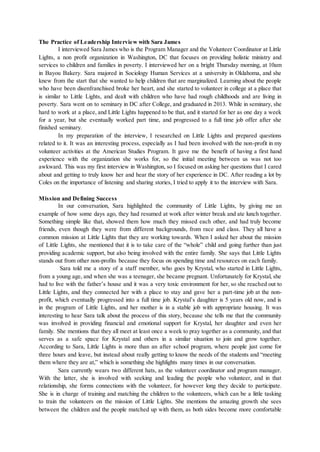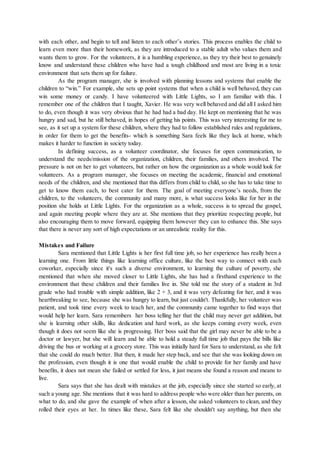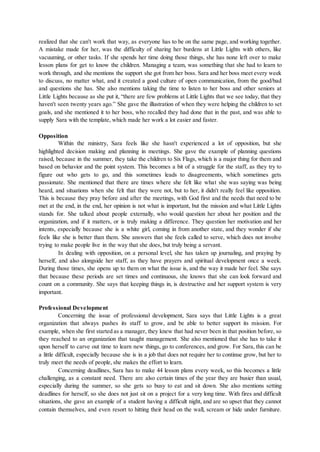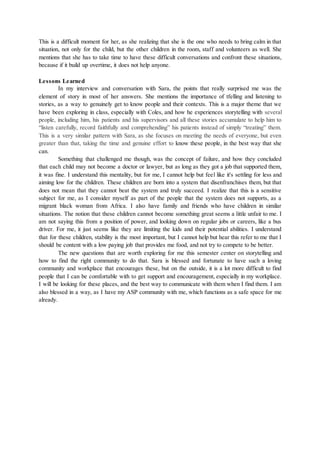ThePracticeofLeadershipInterviewwithSaraJames
- 1. The Practice of Leadership Interview with Sara James I interviewed Sara James who is the Program Manager and the Volunteer Coordinator at Little Lights, a non profit organization in Washington, DC that focuses on providing holistic ministry and services to children and families in poverty. I interviewed her on a bright Thursday morning, at 10am in Bayou Bakery. Sara majored in Sociology Human Services at a university in Oklahoma, and she knew from the start that she wanted to help children that are marginalized. Learning about the people who have been disenfranchised broke her heart, and she started to volunteer in college at a place that is similar to Little Lights, and dealt with children who have had rough childhoods and are living in poverty. Sara went on to seminary in DC after College, and graduated in 2013. While in seminary, she hard to work at a place, and Little Lights happened to be that, and it started for her as one day a week for a year, but she eventually worked part time, and progressed to a full time job offer after she finished seminary. In my preparation of the interview, I researched on Little Lights and prepared questions related to it. It was an interesting process, especially as I had been involved with the non-profit in my volunteer activities at the American Studies Program. It gave me the benefit of having a first hand experience with the organization she works for, so the initial meeting between us was not too awkward. This was my first interview in Washington, so I focused on asking her questions that I cared about and getting to truly know her and hear the story of her experience in DC. After reading a lot by Coles on the importance of listening and sharing stories, I tried to apply it to the interview with Sara. Mission and Defining Success In our conversation, Sara highlighted the community of Little Lights, by giving me an example of how some days ago, they had resumed at work after winter break and ate lunch together. Something simple like that, showed them how much they missed each other, and had truly become friends, even though they were from different backgrounds, from race and class. They all have a common mission at Little Lights that they are working towards. When I asked her about the mission of Little Lights, she mentioned that it is to take care of the ŌĆ£wholeŌĆØ child and going further than just providing academic support, but also being involved with the entire family. She says that Little Lights stands out from other non-profits because they focus on spending time and resources on each family. Sara told me a story of a staff member, who goes by Krystal, who started in Little Lights, from a young age, and when she was a teenager, she became pregnant. Unfortunately for Krystal, she had to live with the fatherŌĆÖs house and it was a very toxic environment for her, so she reached out to Little Lights, and they connected her with a place to stay and gave her a part-time job at the non- profit, which eventually progressed into a full time job. KrystalŌĆÖs daughter is 5 years old now, and is in the program of Little Lights, and her mother is in a stable job with appropriate housing. It was interesting to hear Sara talk about the process of this story, because she tells me that the community was involved in providing financial and emotional support for Krystal, her daughter and even her family. She mentions that they all meet at least once a week to pray together as a community, and that serves as a safe space for Krystal and others in a similar situation to join and grow together. According to Sara, Little Lights is more than an after school program, where people just come for three hours and leave, but instead about really getting to know the needs of the students and ŌĆ£meeting them where they are at,ŌĆØ which is something she highlights many times in our conversation. Sara currently wears two different hats, as the volunteer coordinator and program manager. With the latter, she is involved with seeking and leading the people who volunteer, and in that relationship, she forms connections with the volunteer, for however long they decide to participate. She is in charge of training and matching the children to the volunteers, which can be a little tasking to train the volunteers on the mission of Little Lights. She mentions the amazing growth she sees between the children and the people matched up with them, as both sides become more comfortable
- 2. with each other, and begin to tell and listen to each otherŌĆÖs stories. This process enables the child to learn even more than their homework, as they are introduced to a stable adult who values them and wants them to grow. For the volunteers, it is a humbling experience, as they try their best to genuinely know and understand these children who have had a tough childhood and most are living in a toxic environment that sets them up for failure. As the program manager, she is involved with planning lessons and systems that enable the children to ŌĆ£win.ŌĆØ For example, she sets up point systems that when a child is well behaved, they can win some money or candy. I have volunteered with Little Lights, so I am familiar with this. I remember one of the children that I taught, Xavier. He was very well behaved and did all I asked him to do, even though it was very obvious that he had had a bad day. He kept on mentioning that he was hungry and sad, but he still behaved, in hopes of getting his points. This was very interesting for me to see, as it set up a system for these children, where they had to follow established rules and regulations, in order for them to get the benefits- which is something Sara feels like they lack at home, which makes it harder to function in society today. In defining success, as a volunteer coordinator, she focuses for open communication, to understand the needs/mission of the organization, children, their families, and others involved. The pressure is not on her to get volunteers, but rather on how the organization as a whole would look for volunteers. As a program manager, she focuses on meeting the academic, financial and emotional needs of the children, and she mentioned that this differs from child to child, so she has to take time to get to know them each, to best cater for them. The goal of meeting everyoneŌĆÖs needs, from the children, to the volunteers, the community and many more, is what success looks like for her in the position she holds at Little Lights. For the organization as a whole, success is to spread the gospel, and again meeting people where they are at. She mentions that they prioritize respecting people, but also encouraging them to move forward, equipping them however they can to enhance this. She says that there is never any sort of high expectations or an unrealistic reality for this. Mistakes and Failure Sara mentioned that Little Lights is her first full time job, so her experience has really been a learning one. From little things like learning office culture, like the best way to connect with each coworker, especially since it's such a diverse environment, to learning the culture of poverty, she mentioned that when she moved closer to Little Lights, she has had a firsthand experience to the environment that these children and their families live in. She told me the story of a student in 3rd grade who had trouble with simple addition, like 2 + 3, and it was very defeating for her, and it was heartbreaking to see, because she was hungry to learn, but just couldn't. Thankfully, her volunteer was patient, and took time every week to teach her, and the community came together to find ways that would help her learn. Sara remembers her boss telling her that the child may never get addition, but she is learning other skills, like dedication and hard work, as she keeps coming every week, even though it does not seem like she is progressing. Her boss said that the girl may never be able to be a doctor or lawyer, but she will learn and be able to hold a steady full time job that pays the bills like driving the bus or working at a grocery store. This was initially hard for Sara to understand, as she felt that she could do much better. But then, it made her step back, and see that she was looking down on the profession, even though it is one that would enable the child to provide for her family and have benefits, it does not mean she failed or settled for less, it just means she found a reason and means to live. Sara says that she has dealt with mistakes at the job, especially since she started so early, at such a young age. She mentions that it was hard to address people who were older than her parents, on what to do, and she gave the example of when after a lesson, she asked volunteers to clean, and they rolled their eyes at her. In times like these, Sara felt like she shouldn't say anything, but then she
- 3. realized that she can't work that way, as everyone has to be on the same page, and working together. A mistake made for her, was the difficulty of sharing her burdens at Little Lights with others, like vacuuming, or other tasks. If she spends her time doing those things, she has none left over to make lesson plans for get to know the children. Managing a team, was something that she had to learn to work through, and she mentions the support she got from her boss. Sara and her boss meet every week to discuss, no matter what, and it created a good culture of open communication, from the good/bad and questions she has. She also mentions taking the time to listen to her boss and other seniors at Little Lights because as she put it, ŌĆ£there are few problems at Little Lights that we see today, that they haven't seen twenty years ago.ŌĆØ She gave the illustration of when they were helping the children to set goals, and she mentioned it to her boss, who recalled they had done that in the past, and was able to supply Sara with the template, which made her work a lot easier and faster. Opposition Within the ministry, Sara feels like she hasn't experienced a lot of opposition, but she highlighted decision making and planning in meetings. She gave the example of planning questions raised, because in the summer, they take the children to Six Flags, which is a major thing for them and based on behavior and the point system. This becomes a bit of a struggle for the staff, as they try to figure out who gets to go, and this sometimes leads to disagreements, which sometimes gets passionate. She mentioned that there are times where she felt like what she was saying was being heard, and situations when she felt that they were not, but to her, it didn't really feel like opposition. This is because they pray before and after the meetings, with God first and the needs that need to be met at the end, in the end, her opinion is not what is important, but the mission and what Little Lights stands for. She talked about people externally, who would question her about her position and the organization, and if it matters, or is truly making a difference. They question her motivation and her intents, especially because she is a white girl, coming in from another state, and they wonder if she feels like she is better than them. She answers that she feels called to serve, which does not involve trying to make people live in the way that she does, but truly being a servant. In dealing with opposition, on a personal level, she has taken up journaling, and praying by herself, and also alongside her staff, as they have prayers and spiritual development once a week. During those times, she opens up to them on what the issue is, and the way it made her feel. She says that because these periods are set times and continuous, she knows that she can look forward and count on a community. She says that keeping things in, is destructive and her support system is very important. Professional Development Concerning the issue of professional development, Sara says that Little Lights is a great organization that always pushes its staff to grow, and be able to better support its mission. For example, when she first started as a manager, they knew that had never been in that position before, so they reached to an organization that taught management. She also mentioned that she has to take it upon herself to carve out time to learn new things, go to conferences, and grow. For Sara, this can be a little difficult, especially because she is in a job that does not require her to continue grow, but her to truly meet the needs of people, she makes the effort to learn. Concerning deadlines, Sara has to make 44 lesson plans every week, so this becomes a little challenging, as a constant need. There are also certain times of the year they are busier than usual, especially during the summer, so she gets so busy to eat and sit down. She also mentions setting deadlines for herself, so she does not just sit on a project for a very long time. With fires and difficult situations, she gave an example of a student having a difficult night, and are so upset that they cannot contain themselves, and even resort to hitting their head on the wall, scream or hide under furniture.
- 4. This is a difficult moment for her, as she realizing that she is the one who needs to bring calm in that situation, not only for the child, but the other children in the room, staff and volunteers as well. She mentions that she has to take time to have these difficult conversations and confront these situations, because if it build up overtime, it does not help anyone. Lessons Learned In my interview and conversation with Sara, the points that really surprised me was the element of story in most of her answers. She mentions the importance of tfelling and listening to stories, as a way to genuinely get to know people and their contexts. This is a major theme that we have been exploring in class, especially with Coles, and how he experiences storytelling with several people, including him, his patients and his supervisors and all these stories accumulate to help him to ŌĆ£listen carefully, record faithfully and comprehendingŌĆØ his patients instead of simply ŌĆ£treatingŌĆØ them. This is a very similar pattern with Sara, as she focuses on meeting the needs of everyone, but even greater than that, taking the time and genuine effort to know these people, in the best way that she can. Something that challenged me though, was the concept of failure, and how they concluded that each child may not become a doctor or lawyer, but as long as they got a job that supported them, it was fine. I understand this mentality, but for me, I cannot help but feel like it's settling for less and aiming low for the children. These children are born into a system that disenfranchises them, but that does not mean that they cannot beat the system and truly succeed. I realize that this is a sensitive subject for me, as I consider myself as part of the people that the system does not supports, as a migrant black woman from Africa. I also have family and friends who have children in similar situations. The notion that these children cannot become something great seems a little unfair to me. I am not saying this from a position of power, and looking down on regular jobs or careers, like a bus driver. For me, it just seems like they are limiting the kids and their potential abilities. I understand that for these children, stability is the most important, but I cannot help but hear this refer to me that I should be content with a low paying job that provides me food, and not try to compete to be better. The new questions that are worth exploring for me this semester center on storytelling and how to find the right community to do that. Sara is blessed and fortunate to have such a loving community and workplace that encourages these, but on the outside, it is a lot more difficult to find people that I can be comfortable with to get support and encouragement, especially in my workplace. I will be looking for these places, and the best way to communicate with them when I find them. I am also blessed in a way, as I have my ASP community with me, which functions as a safe space for me already.



